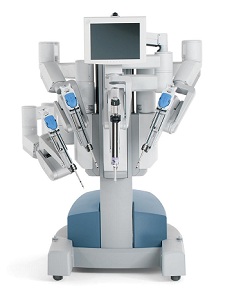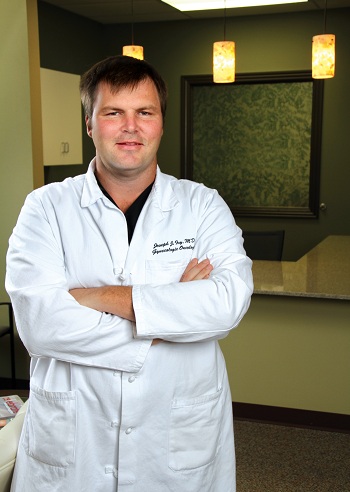Mamas, we’d like you to help us welcome a new sponsor to nwaMotherlode, Dr. Joseph Ivy. Dr. Ivy has a new clinic on the Willow Creek Women’s Hospital campus in Johnson and we’re really impressed with the technology he uses to make various cancer treatments less invasive.
We asked Dr. Ivy some questions about his new practice and the special technology he has at Ivy Women’s Cancer Care.
As a gynecologic oncologist, what types of cancers do you treat?
a: To become a gynecologic oncologist, you must first complete a residency in OB/GYN. From that experience, I learned to perform surgeries on general conditions that women may face, such as basic hysterectomies and the removal of non-cancerous ovaries.
I still perform these surgeries on a regular basis. To become a gynecologist, I trained for an additional three years at the University of Minnesota Medical Center in Minneapolis, MN. During this training, I learned how to perform cancer-staging surgeries on the female reproductive organs. Specifically, I operate on cancers of the cervix, uterus, fallopian tubes, ovaries, vagina, vulva and of the abdominal wall lining. Through my fellowship training, I am able to offer these surgeries through minimally invasive techniques that allow most patients to be discharged the following day and experience less pain and scarring. I am one of the few gynecologists in the nation that are certified to perform and teach these highly advanced surgeries on the da Vinci Surgical System, which is a robotic surgical technique.
Where is your new office located?
a: Our office is located on the Willow Creek Women’s Hospital Campus. The address is 5501 Willow Creek Dr. Suite 202, Johnson, AR 72741. Click here to visit the center’s website.
Tell us more about the “da Vinci robot” to help with various procedures. Does it help make surgery less invasive?
 a: I trained on the da Vinci Surgical System for three years during my gynecologic oncology fellowship at the University of Minnesota. I use it almost exclusively to perform cancer staging surgery for cervical and endometrial cancers. The da Vinci robot (pictured at right) offers the patients a rapid recovery and return to their normal activities that other open cancer surgeries do not. My patients typically are well enough to be discharged the day after surgery with minimal pain and scarring. Whereas routine open surgeries require a full six weeks of recovery, my patients are able to return to their routine and activities usually within one-to-two weeks and can go back to work within three weeks if desired.
a: I trained on the da Vinci Surgical System for three years during my gynecologic oncology fellowship at the University of Minnesota. I use it almost exclusively to perform cancer staging surgery for cervical and endometrial cancers. The da Vinci robot (pictured at right) offers the patients a rapid recovery and return to their normal activities that other open cancer surgeries do not. My patients typically are well enough to be discharged the day after surgery with minimal pain and scarring. Whereas routine open surgeries require a full six weeks of recovery, my patients are able to return to their routine and activities usually within one-to-two weeks and can go back to work within three weeks if desired.
Which procedures can you use the robot for?
a: I use the robot for all of my non-cancerous surgeries as well as surgeries for cancer of the uterus, and early stage ovarian cancers.
Why do you have such a passion for helping female cancer patients?
a: Nothing is more rewarding than helping someone who is facing a life threatening disease. Women deal with a lot, emotionally and medically, and I have established our practice to make the entire treatment process as patient friendly as possible. Fighting cancer is a terrible time in a woman’s life and we want to be a practice that understands that and does everything we can to help them. I’m really glad to be in Northwest Arkansas and to provide a level of care that previously was not available in the area.
What is the most common cancer among women?
a: Endometrial cancer affects more women each year than any other gynecologic malignancy. Fortunately, if caught early, surgery alone can cure the disease. And again, I use the da Vinci robot to perform the surgery, so most women are able to be discharged the day after surgery and recover more rapidly than traditional open surgery.
What kinds of screenings do you offer for women who are concerned about cancer?
a: Breast, ovarian, and endometrial cancers have family connections and I offer office evaluations to determine your risk of developing these forms of cancer. If the risk is great enough, I would recommend a surgery to remove the risk associated with the familial condition. Furthermore, women with estrogen or progesterone receptor positive breast cancer are candidates for these adjuvant surgeries as well and I would be happy to see them in my clinic for an educational office visit.
Are there any new medical advances in the field that women might not know about?
a: The advances in gynecologic oncology come quickly. The ones I feel are most applicable to the general population currently are the HPV vaccine, use of minimally invasive techniques to treat gynecologic conditions, recommendations for familial cancer screenings, and new developments in the way we deliver chemotherapy for advanced ovarian cancers. I would recommend patients contact their doctor or my office to discuss these topics.
Where are you from and how long have you been living in Northwest Arkansas?
a: I am a native Arkansan. I was born in El Dorado and I lived there until I graduated high school and moved to Little Rock, where I completed college and medical school. From there I spent seven years in Louisiana where I completed an OB/GYN residency and practiced pelvic surgery. I then moved to Minnesota for three years to complete my gynecologic oncology fellowship after which I moved to Northwest Arkansas to begin practice.
What led you to the area?
a: I moved to Northwest Arkansas to be closer to my family and to develop a Da Vinci cancer program. Northwest Arkansas is one of the few areas that has a Da Vinci robot that I would able to have full access to for two-to-three days per week. This would allow me to give more patients the benefits of the robotic surgery and the freedom to pursue my passion for less invasive surgical options. I truly believe in the benefits of minimally invasive techniques for patients and surgeons alike and I have set up luncheons and seminars to help patients within the community understand the benefits they obtain through these surgical techniques.
 Tell us a little about what you like to do when you’re not seeing patients.
Tell us a little about what you like to do when you’re not seeing patients.
a: I have a 9-year-old son who lives in Tulsa, OK, so much of my time is spent around his activities. When I am not spending time with him, I enjoy fly-fishing for trout in the waters of Northwest and Central Arkansas. I also enjoy playing golf, riding mountain bikes and collecting wine.
Read more about Dr. Ivy and the cancer care clinic by visiting his website, www.ivycancercare.com.

